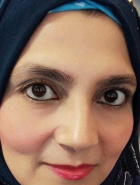War And Peace Poem by Ghazala Lari
War And Peace
When will all the wars end, we plead to know,
When will the head of country truly think?
For common folk, to perish as they go,
Their lives mere pawns to sate the leader's brink.
Must one lay down their life, their dreams, their all,
To satisfy the ego of the high?
While wise men hide, behind the curtain's fall,
The world at war, no hope in sight, oh, why?
Who shall rise and take the lead, we ask,
When wisest souls stay hidden, shrouded deep?
For fear of government's menacing task,
Declaring criminals those who dare speak.
So many brothers, sisters left displaced,
Orphaned children weep, their sorrows vast.
Their tender years forever interlaced,
With silence of the people, unsurpassed.
We mustn't let the criminals decide,
Our fate, our lives, our nation's destiny.
Their blinded eyes, they cannot see the tide,
Of pain and suffering, our hearts decree.
A voice must rise amidst the lost and pained,
To find the courage and speak out, unfurled.
Through nonviolent revolt, change ordained,
Each one must play their part within this world.
As voices unite, they reach the deafened ears,
Of those in power, who silence the cries.
And one day, hope shall conquer all our fears,
A war-free world, where peace forever lies.
So let us wake, arise from slumber's hold,
And strive for harmony, both young and old.
Explanation of the above poem
The poem speaks of the devastating effects of war and the inability of those in power to find peaceful solutions. It expresses the frustration of common people who are mere pawns in the games of leaders and asks when wars will end. The poet also questions the silence of the wise, who could potentially bring about change but remain hidden.
One possible interpretation of the poem is that it is calling for a revolution, with the 'deafened ears' of the powerful being addressed directly. The last lines seem to suggest that change will come when people unite and speak out against injustice. This interpretation is reinforced by the use of the word 'revolt' in the line 'Through nonviolent revolt, change ordained.'
However, the poem also contains elements of despair and hopelessness, as it describes the suffering of innocent people and the seeming unwillingness of leaders to change. The question 'Who shall rise and take the lead? ' implies that the poet does not see a clear path forward, and the repeated use of 'they' in reference to the powerful suggests that the poet is not confident in the ability of any particular individual or group to bring about change.
Ultimately, the poem raises important questions about the nature of power, the role of leaders in times of conflict, and the responsibility of individuals to speak out against injustice. It calls for a revolutionary change while also acknowledging the challenges and complexities involved in bringing about such change.
This poem has not been translated into any other language yet.
I would like to translate this poem